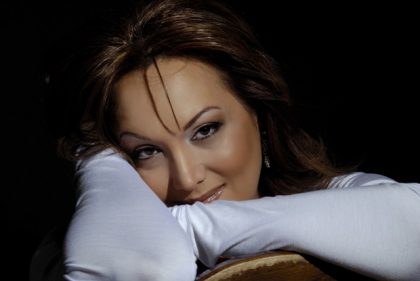
Azad-Hye Special
She has, with no exaggeration, the most beautiful smile that alone makes her worth five stars.
The first time I saw her was in year 1982 during Konstantin Orpelian Big Band concerts in Aleppo, where she looked like a shiny pearl singing and dancing on the stage. Her voice was incredibly smooth, supple and dreamy. Her performances were full of passion and conviction. Later on I had the chance to know her better and discover the human side of her personality, that made her performances heartwarmingly sincere and strong, especially the ballads – her most stunning and remarkable pieces of work – in addition to both folk and patriotic genres.
She has become more matured with age. Her voice still sounds as fresh as ever. Her recent recordings combine originality, from where she started her solo career, with a new approach, reflecting time in its different periods.
I?m glad to introduce you a high class, well crafted masterpiece called Suzan Markarian, who personally was the reason for the passion I have today toward the Armenian contemporary music from the early ?Estradayin? period till today.
Suzan Markarian will be the first exclusive guest of my new series of articles called “Great Armenian Women of All Times” to be released in a non- sequent order.
Where do you see yourself more in the following categories; a mother, singer or former producer of your daughter Sirusho (note: Sirucho is a known singer and Eurovision star)? How do you like people to remember Suzan Markarian?
Motherhood comes first of all categories that you mentioned, something most women dream about. For me it is a mission partly successfully accomplished but there is still a lot to do. I feel lucky and proud to be the mother of such an amazing daughter who keeps surprising me with her actions that satisfy both my heart and soul. I am not saying this because she is my little girl, but Sirusho is the kind of daughter I wish every mother had.
I always enjoyed being a singer. It took 31 years of my life for which I do not regret. To me, music is more than a career; it is life itself, after my family of course. I stopped being the producer and manager of my daughter when I realized that she could finally depend on herself. Now she works with her team and has a manager of her own, her best friend; someone who can both handle this position and take good care of my baby at the same time. You can say that those three categories are simply the life of Suzan Markarian.
As a singer, when did you start your career?
Since I was a little girl I always liked to sing in different choir groups, but the first serious step and good starting point for me was in 1977 when I was accepted in ?Serpentine? Vocal Ensemble, the most well known band in Yerevan at that time conducted by Axel Pagunts. After one year of rehearsals I gave my first professional performance on the stage on 24th of May 1978; a very significant date, because it was the beginning of a long journey I decided to go through.
During those years, I was dedicated to the art that I honestly interpreted. I loved the stage and still do, because nothing compares to singing live on a stage, accompanied by a big band.
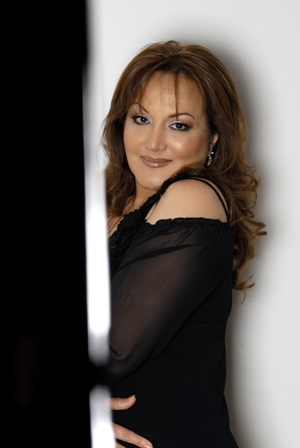 Last year was the 30th anniversary of my singing career. What a great life! I still remember those years with every single detail. What kind of musical education did you get?
Last year was the 30th anniversary of my singing career. What a great life! I still remember those years with every single detail. What kind of musical education did you get?
When I was a child I went to Choir School of Armenia, class of Children?s Choir. Later I was accepted at the Vocal class of Armenian Jazz and Contemporary College. Due to my big passion to sing, dance and act I decided to go to Institute of Theatrical Art of Yerevan, class of Musical Acting instead of applying to National Conservatory.
During those studying years I was very busy working as well. First at the ?Serpentine? group as I said before, but later I was selected to become one of the lead singers of the Armenian National Jazz Band, conducted by Maestro Konstantin Orpelian, an opportunity that every student in the conservatory dreamt about. At that time I was only nineteen years old, the exceptional youngest singer of the band. Compared to the rest of the singers I should have had previous experiences and been older enough to sing with such a big band, but Maestro Orpelian had seen one of my previous performances during Serpentine concerts and decided to take me to his band.
I guess you already began to answer my next question: we know that you were part of Konstantin Orpelian Big Band that toured all around the world including Syria in 1982. How did this cooperation begin and why it came to an end?
I joined the band after an exceptionally easy audition. Normally other singers used to go for several auditions then waited a long time for the maestro to decide if he was going to select any of them.
There were very difficult songs that the maestro had chosen for me to sing. First, I was afraid I could fail performing such sophisticated songs but after long days of rehearsals with the band he proved that he was 100% right with his choices.
After many years of touring with the band, I decided to take a break, because I was going to have a baby, an issue that topped all priorities. At that time, I was switched to become one of the singers of the National Radio Symphonic and Contemporary Orchestra, whose activities were mainly in Yerevan. However, after couple of years I returned back to work with Maestro Orpelian.
It was the most important 10 years of my life that I have spent with both Orpelian and the National Radio Orchestras.
Years later the band stopped its activities and the singers began working on their own. This was another pleasant chapter of my life, when I used all my accumulated experiences to prove myself as an individual artist who organizes her concerts by herself in both Yerevan and other regions in Armenia. During this period I was invited by different Armenian communities in the world, a move that gave me a chance to be exposed and share my art with Armenians in Diaspora as well.
Later on Sirusho joined me to participate in my concerts. She was only seven years old when she had her first performance on stage. After becoming a professional singer we began to tour and work together as a team. Each one of us had her own way to present Armenian music in its different genres.
What advantages did you get while working with Orpelian? And how important are they for today?s singers who usually perform using minus playbacks during their concerts?
I gained a lot of experience through the years I worked with Konstantin Orpelian Band. Although I previously used to sing live when performing with Serpentine, with Orpelian it was something else. I tasted and enjoyed the art of singing live. What I mean ?Live? is first to use your vocals to sing live on the stage and second to sing with the company of a live performing big band; two basic elements which are somehow ignored by nowadays singers.
You cannot sing a song in the same way you did the day before. The same concept applies to the band members; they are unable to play identically the same way every day. And when sometimes the band goes off the record and begins to improvise, it encourages you to create and do the same as well. That is what I call the maximum pleasure of singing live.
Practice is another key to success. Every practice day is a chance for you to explore your inner world and thus improve your character day by day. At the end, you feel you understand yourself better than before.
 During practice you discover the stage mysteries and the secrets of how to overcome your fears. But during live concerts after your direct contact with the audience, you will automatically feel their positive or negative reaction which depends on how confident your performance is.
During practice you discover the stage mysteries and the secrets of how to overcome your fears. But during live concerts after your direct contact with the audience, you will automatically feel their positive or negative reaction which depends on how confident your performance is.
In a word, daily rehearsals help increase your self-confidence and thus improve the level of your performance. I don?t know how artists today rush up to call themselves “stars” without paying attention to such big issues.
At the end, I have to add that studio recordings have the same level of importance as singing live. I had the chance to experience that while working with the National Radio Orchestra. Their working system was completely different than Orpelian?s. Usually they had a repertoire and a main rule, according to which every single artist was obliged to record one song per month. Eventually, at the end of the year, each artist had twelve songs; a ready plan for an album project and more choices of songs to be performed during concerts. I feel very lucky to be part of this project and the songs I have recorded were written especially for me by great composers like Aram Satian, Robert Amirkhanian, Vartan Ajemian, Ruzan Kalsdian, Konstantin Petrosian, Konstantin Orpelian, Elvina Magarian, Melik Mavasakalian and others. It was a big opportunity for me to work with such great names and I am proud to have such recordings, which are kept until this date at the National Radio?s Golden Archive. Those songs are simply my life. They remind me of some sweet memories every time I listen to them. I call them the unforgettable Armenian standards.
Few years ago you released your first album entitled “Hantibum” (Meeting), which included new songs in addition to some old standards. Why wasn't there a second album? Especially that you have recorded many songs and been part of different projects like both “Love Songs” projects by Souren Kniazian, “Songs of Marine Gyulumian” project and others. What I would like to ask are you thinking of releasing a second album of your own?
(Laughing) Actually “Hantibum” was not my first CD. I had another album prior to “Hantibum”, but unfortunately was released only in USA and I personally have only one audio cassette left with me. I guess it is still available at few shops in USA. It included my all time favorite songs like “Garmir Dzaghig me Karuni” (Red flower of Spring) by Robert Amirkhanian, lyrics by Misak Medzarents and the old version of “Sern antsav” (Love has gone) by Aram Satian, songs by Elvina Magarian and others. This was followed by “Hantibum” which included different genres like folk, romance, oldies and contemporary like the song “Ser” (Love) by Arthur Krikorian.
After “Hantibum” there was a busy period full of concerts here and there, meanwhile I have recorded many songs from different composers. If I collected all these songs I might release two complete albums, but this was impossible because each one was released in a separate project belonged to the composer himself. In addition to Kniazian and Gyulumian that you mentioned, there were names like Edgar Gyanjumian, Marine Takagjian and others. Being part of such projects and touring the world with Sirusho caused my own album project to be postponed for quite a long time.
Now that I have recorded new songs and rearranged few others I will be releasing two different albums. Why two? Because of the big quantity that I have collected, besides I do not like to mix up musical genres together. Therefore, there would be an album for love songs and another one with popular and patriotic songs.
Has your career as a singer interfered with being a manager and responsible for Sirusho too?
I have never been a manager of my daughter, but people always got that impression because of our coordinated work and concerts. Upon receiving any concert proposal, it was me as a mother who used to take care of both managing and organizing issues, since she was very young at that time. Concert invitations usually were sent to both of us, so my job was to plan and coordinate the dates in a way that suited both of us. After a certain time Sirusho began to receive her own invitations and took care of her business. Now being more professional, she is working with a manager and a producer of her own. Few years ago, when I had my own concerts, she used to participate as a guest with a song and a duet, but lately I am the guest of her concerts (laughing). It is a big joy watching how people appreciate her.
Today it is very difficult to become a brilliant superstar. Do you think it was easier for Sirusho since you have been through this yourself before?
I completely disagree with you. By the way, this is a delicate question, whose answer does not satisfy anybody.
Some people think that it is very easy for children to work in the same business their parents are. I know how hard show business is today and the difficulties someone may face. Naturally as a mother, I have to guide and help my daughter; to avoid mistakes and problems I have made before, either technical issues or others. However, all these would not help her if she does not possess talent in the first place. Besides, we always help other young people, so why should we be indifferent when it comes to our child?
I have never used my public relations to recommend Sirusho to perform in a certain concert or to participate in a big event. Such cases had never happened, because she had already proved herself in this domain.
People have their perspective and see things the way they want, but they do not know the fact that in our business you will stand alone in front of the art you are presenting and eventually be responsible for all your acts. When Sirusho sings on stage she is there alone, there is no way to help her, even if I happen to be on the backstage. I remember once when Sirusho was younger one of the reporters hinted that she would not succeed without the help of her parents. She said, ?You are right; both my parents help me as any parent would definitely do. But they don?t sing instead of me?. It was the last interview this question popped in.
If somebody with a mediocre talent was pushed by his parent?s recommendations and public relations, time will prove that this talent will expire because it is limited and would not go any further.
Believe me, both I and my husband would not have let Sirusho choose the show business if she did not have enough talent or high standards to survive the way she does today. I am not saying this as her mother, but as a professional; she is a gifted person and you have witnessed several times how confident she performs on the stage.
Looking through your musical repertoire, there is one specific song “Sern antsav” (Love has gone) by Aram Satian and lyrics by Levon Blboulian, which was first recorded by Narine Haroutyunian, but later it became popular when you performed it and people always liked to hear you sing it. What is the story behind this song, especially that it was and still your husband?s favorite?
|
Suzan and Sirusho during Beirut concerts |
Let me add that though Narine Haroutyunian?s version was included in the original vinyl record but your version of the song could be found in the 2 CD complete works of Aram Satian, originally released few years ago.
I performed “Sern antsav” during my concerts. At times when I did not include this song in my repertoire people used to request it especially in Diaspora where the song had gained big popularity among people of my age and a generation after. You can say it remained with me for more than 25 years. To make it even more popular to the new generation, I decided last year to record the song with a new arrangement and later a new video clip was released. Now it gives me a good feeling when I hear youngsters say that they love “Sern antsav” and consider it very contemporary, without being aware of its original version. It is very important to have the appreciation of the young generation, because this means that the song has become one of the all-time Armenian standards.
And what is related to my husband, I have nothing to comment. It is his favorite song (smiling).
For you, is working with young composers a new experience or you like to encourage them and thus keep yourself updated?
I feel honored that I have worked with Armenian big composers in the past and very glad to work with young composers too because they are my only way to get in touch with their world, the new world. Working with them keeps me young and alive. And this enables me to understand their musical thinking and preferences so I know how to reach them. They will not show any interest if I keep singing with old systems without updating myself. On the other hand, I feel happy when some of them receive big offers or awards based on the success of our coordinated work. I am always open to new ideas, if they are coming from talented people. I always hear new songs and frequently get proposals, but sometimes I reject them if they do not come with anything new. I try to explain their faults and mistakes in a way they do not get hurt, because they are still young and you can feel their passion of creativity. Some are convinced and try to work hard; others get upset considering themselves little Mozarts or Beethovens.
It is very important to give the right guidance to the gifted one, especially that today?s show biz commerciality will lead them to wrong directions in their drive for success. I keep reminding them that their work should be of high caliber, because quality is all that matters for a respectable performer.
Have you ever performed any of Sirusho?s composed songs?
No, I have not, but, in fact, one of the songs composed by her and written especially for me will be included in my new album. It was a surprise gift from her. After I heard the song I suggested making it a duet with her.
It is impossible to compare the past ?Estrada? with today?s show business. What can you say about the big quantity of the “Stars” and the great variations of the quality they stand for?
I am pleased when I see talented people entering the world of music today but big quantity has its negative side as well. The latest technology available in our studios made the dream come true for many people, thus the so-called “Stars” were born, sometimes with vocal abilities and talents that they do not really possess. Their concern is limited to the commercial side of the whole project. They are more concerned with issues like what to wear and how to wear to be more attractive in the video clip, how to raise funds or find a producer for the album? etc., while a gifted singer focuses only on his talent, worries about how to present his art in an appropriate way, keeping up the high level steadily.
A real artist is someone who can sing live on a stage for a minimum two hours with high standards and not anyone who can constantly release records at the studio. Time will test all those “Stars” and only real artists will float.
The “estrada” genre that we experienced in the past could be even considered as “classic” today, while it is hard to name the genre that represents the contemporary “Stars”. Concerts today are based on providing attractive and commercial shows, something that we did not have to worry about in the past. The purpose of performing any song was not to commercialize it, but only to present a masterpiece of a big composer within high standards. I feel strange today when concert organizers find that ballads make people sleepy and they prefer to execute songs with rhythmic tunes to capture the audience and keep them awake all the time.
What is the reason behind all this? Is it the result of changing times or change in the people?s demand?
I guess change of time has something to do with it. In the past, it was impossible to attract the audience with short skirts or bare legs. Whatever you wore or did not, the situation would not have changed; you had only to sing with high level vocals to be appreciated. But today, it is pity when you see artists that work hard on themselves for years improving their vocals or spending a long time to choose the right songs with good melodies that suit the lyrics, but at the end they cannot have the same share of listeners comparing to those who adopt some indecent or unconventional ways to capture the attention of the audience. This is a kind of disease or virus we caught from the west and particularly from the American market, because people today are unfortunately ready to copy anything, instead of creating. And the worst is copying without realizing if it fits or not. Even the construction of the song has been changed due to the change in people?s demands. For example, I?m not a fan of the Rap that entered our music industry some 6-8 years ago, because I do not consider it music in the first place. But, after all, it is a genre we have to take in consideration whether we liked it or not. There are certain elements that any rap song must have, like the short melody, the special arrangements and effects.
In Russian or American rap songs we notice that the street language is what they use because either Russian or English languages don?t have any other version. But it?s not the same when it comes to Armenian rap songs since the Armenian language has the daily spoken simple version and the formal or what we call the stage language that we use in writing song lyrics or in speeches, articles, formal occasions?etc. If we are going to copy the Americans then we have to use our daily life words, which are not suitable to the song construction. At the end, you will have a song with very low level lyrics including street vocabulary, something that we try hard to keep it away from our children, but unfortunately too much emphasized in all Armenian rap songs. Sometimes you cannot even distinguish if the language is Armenian or not!
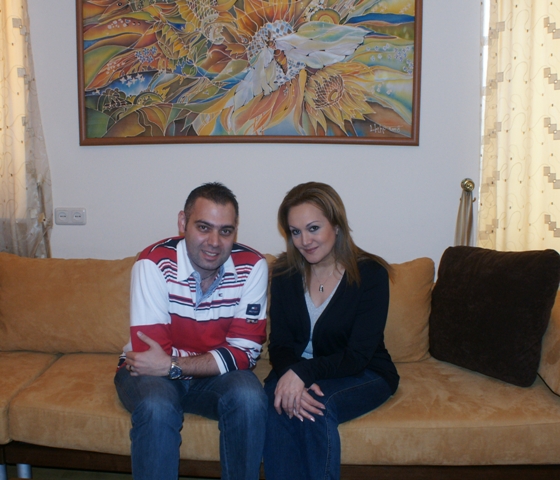 |
With Carlos Jose Bourdjian during the interview |
What are your future plans?
I guess there are many plans, part of them are already accomplished like participating in the 80th anniversary of Konstantin Orpelian and the special evening dedicated to Arno Babajanian. There was the idea of celebrating the 30th anniversary of my career in a special concert and I want Sirusho to be part of it as well. But since she is very busy lately with her concerts abroad we are not able to fix the date.
As I previously mentioned, there will be the release of my both new albums. But, lately I am thinking about the possibility of combining them into one, which I promise my fans to launch it very soon. There are other undecided plans that I do not want to talk about in details now.
Congratulations in advance for your new unreleased album. Regarding your other plans, I wish you nothing but all the success on behalf of Azad-Hye team. And finally, thank you for sharing your thoughts and worries through this honest conversation and your kind hospitality as well.
Photos:
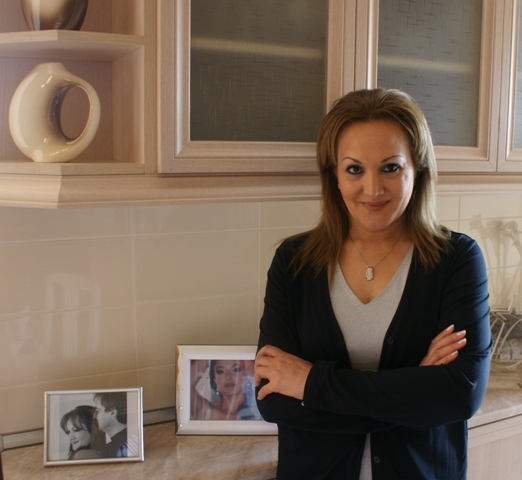 |
At home |
|
Suzan and Sirusho |
|
With Shushan Bedrossian after Aleppo's concert |
|
With friends Dikran Bedrossian, Hrach Keshishian and Valerie Sarian |


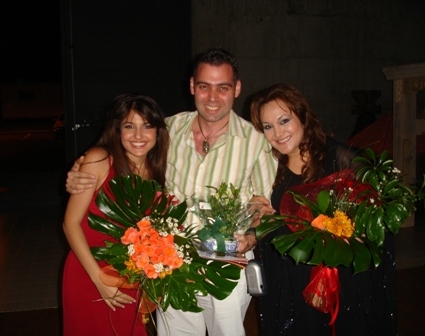
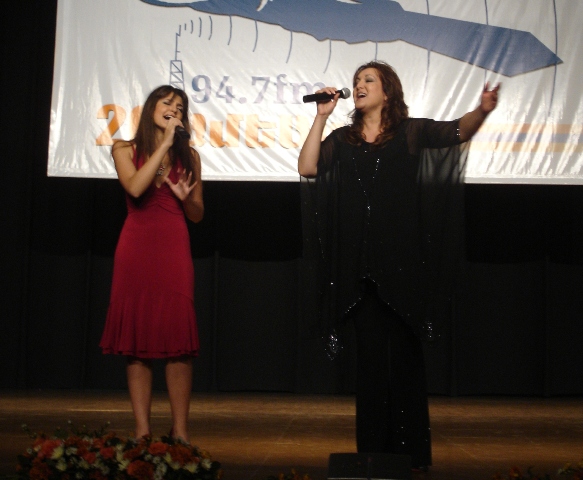
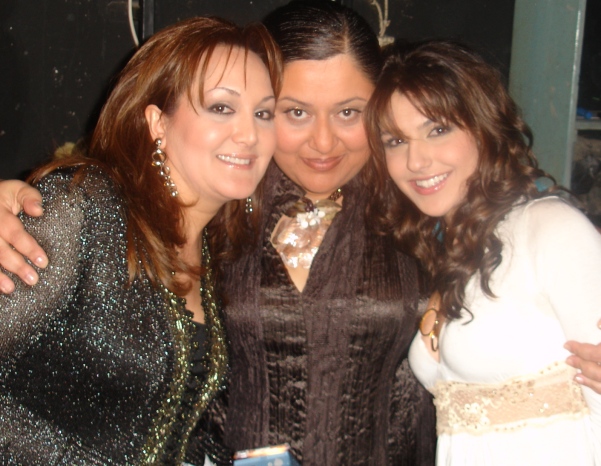
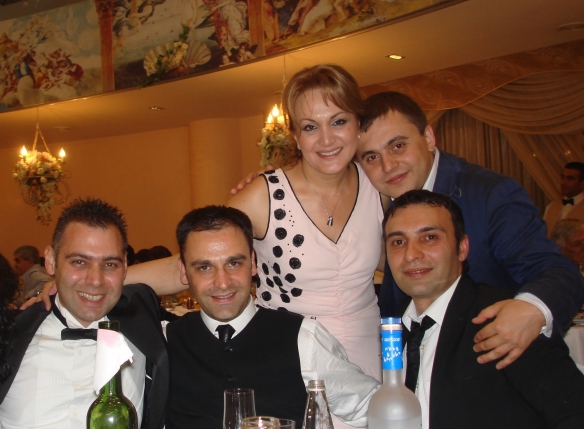
B e a u t i f u l article — thank you!
Very well written article, congratulations!